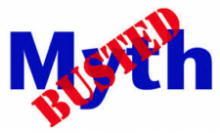 In their outstanding book “Discover Your Sales Strengths,” Benson Smith & Tony Rutigliano of the Gallup Organization explain that “much of what has been written and taught about sales excellence has little to do with what really matters. All too many managers, authors, and so-called sales gurus are dead wrong about what it takes to be a great sales performer.” In research conducted by the Gallup Organization, they identified several myths about what it takes to succeed in sales. In my last post, I discussed the first four. In this post, I will address the remaining three:
In their outstanding book “Discover Your Sales Strengths,” Benson Smith & Tony Rutigliano of the Gallup Organization explain that “much of what has been written and taught about sales excellence has little to do with what really matters. All too many managers, authors, and so-called sales gurus are dead wrong about what it takes to be a great sales performer.” In research conducted by the Gallup Organization, they identified several myths about what it takes to succeed in sales. In my last post, I discussed the first four. In this post, I will address the remaining three:
The Money Myth – All salespeople are motivated by money.
Fact: Not all salespeople are motivated by money. Even salespeople who have a strong desire to earn significant incomes are often motivated by other factors as well. Gallup’s research shows that motivation is often very different for different salespeople. For example, Gallup’s researchers met countless successful salespeople who did poorly in school. Why? – Because school did not provide the right motivational rewards to satisfy them.
Gallup found phenomenal sales reps that were happy to earn $80,000 a year, and they found phenomenal salespeople discontented with earning $300,000 a year. If you’re anything like the best salespeople Gallup studied, your motivation is not one-dimensional.
Research conducted by Dan Pink and explained his book titled “Drive,” shows that people are more motivated by intrinsic rewards than extrinsic rewards. To a salesperson, intrinsic rewards are things like recognition, a sense of purpose, fulfillment, satisfaction or enjoyment. It also includes the love of selling, a feeling of mastery or even when they have something to prove to others. Extrinsic rewards are more material and include things like money, toys, vacations and other prizes. Over the last decade we have witnessed a significant shift in salespeople who are motivated more by intrinsic rewards than extrinsic.
Salespeople are often motivated by a desire to feel significant, or by competition, or by a desire to be in charge. Some salespeople have an intense need for the respect of their colleagues or customers. Your salespeople do what they do for their reasons, not yours. Find out what drives them personally and find a way to synchronize what they want with what you want. Treating people fairly does not mean treating them all the same.
The Desire Myth – If you can think it, you can achieve it. People can do anything they want to do as long as they are willing to work hard and make it happen.
Fact: Motivation is critical to excellent performance, but motivation alone is not enough. Our society sends the message that people can do anything they want to do as long as they are willing to work hard and make it happen. We hear this from elementary school on, but in the back of our minds, we know this just isn’t true. People need the appropriate strengths in order to be successful in a given occupation. Motivation, by itself, is not sufficient if you are to become a superior salesperson. Strengths and skills are just as important as motivation. Motivation without strengths and skills is wasted. Strengths and skills without motivation is untapped potential.
The Training Myth – Training alone will turn an average performer into a top performer.
Fact: It is hard to ignore the fact that while most of a company’s sales representatives go through the same initial training program, there is a big difference in the results those salespeople generate. Why? While Gallup believes that training is helpful to improving sales performance, it helps those with inherent strengths, primarily talent and motivation, much more than it helps poor performers. Yet much of the training that companies provide is directed toward the poor performers.
Companies should provide training only to those that have the crucial elements for success (Desire, Commitment, Accountability and a Positive Outlook) and the strengths to capitalize on that training. Training people without these factors is an exercise in futility. Below average performance are typically plagued by a raft of hidden weaknesses and the lack of the crucial elements for success rather than a lack of training. Your best return on investment often comes from training your top performers to be even better.
Moreover, in order for training to be effective, sales management must reinforce the training and put the right systems and processes in place to support it. These systems and processes include: clearly defined target markets, strategies and goals, key metrics that can be used to hold salespeople accountable using a pipeline management tool and an effective sales coaching process. In addition, the compensation plan needs to reward the right behaviors. Therefore, while training is necessary for building a high performance sales organization, it is not enough all by itself.
The Bottom Line: Recruit salespeople that are motivated and have the strengths that will support their ability to sell value, build relationships and gain commitments. (You will learn more on this later.) Make sure those individuals believe in the value you deliver to customers and are passionate about the products and services you sell.
Find a process for selling that fits the products and services you sell within your specific industry. Use it as an overriding strategy and a means for communication, but be careful not to compel every salesperson to operate in exactly the same way. Give salespeople the flexibility to choose a style and set of techniques that mesh with their strengths. Train those people to maximize their effectiveness. Remember, your employees do what they do for their reasons not for yours. Find out what drives them personally and find a way to synchronize what they want with what you want. Treating people fairly does not mean treating them all the same.

